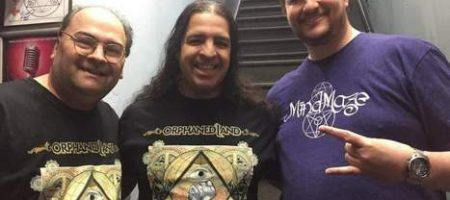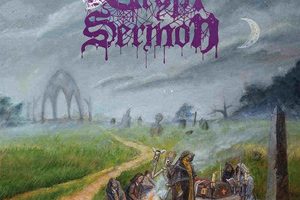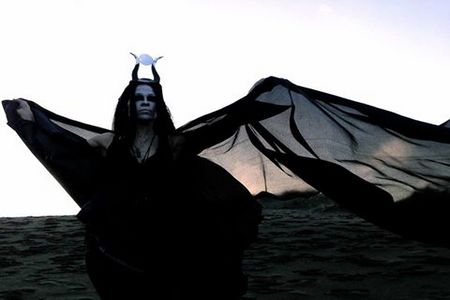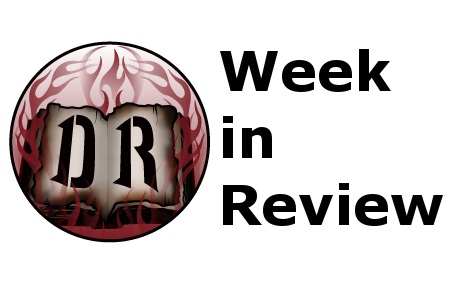Crypt Sermon – Arise the Ruins
Monday, 30th September 2019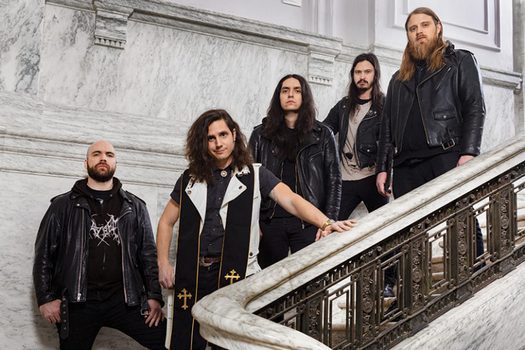
Epic doom metal as a sub-genre sets a specific feel and atmosphere that excites and delights when performed to expectations. The combinations of riffs, tempos, and melodies send chills down spines, electricity reigns from head to toe, the nature of a slow headbang or ‘doom dance’ may take shape. What probably started from the Black Sabbath-era of Heaven and Hell has not lost any shape decades later – and in 2019 this could be the year that metal historians look back as quite a benchmark for releases. This scribe would include Philadelphia-based Crypt Sermon in that discussion through their sophomore offering The Ruins of Fading Light.
Four years past their debut album Out of the Garden, the quintet really dug deep in their creative well to make the songs distinct, special, and alluring – the interludes equally individual and breathtaking. We reached out to drummer Enrique Sagarnaga to have an informative discussion regarding the latest effort, the four-year gap between records, thoughts on the recent upswing in outstanding epic doom releases – plus discussion on what metal means to him growing up in Bolivia, as well as how the band handled a recent album release show that had to change venues on the fly.
Dead Rhetoric: Let’s start with the impromptu venue switch the night of your album release show in Philadelphia – tell us the circumstances surrounding this and how you were able to salvage the night for the sold-out crowd?
Enrique Sagarnaga: Sure. It was a very unfortunate situation. We were not aware that the venue booked for this show had a problem with a municipal code violation. I don’t know if it was a fire exit issue or an exposed wiring problem, but there was something that needed fixing. Early into the evening, a new resident in the area called the cops when they saw a crowd of people clad in black congregating across the street from them at the venue. When the cops came, they brought L & I. I remember the first band went on – three or four songs into the set, a friend of mine texted me to say he couldn’t get into the venue, so I stepped outside to see 4 or 5 police vans parked out front. An L&I officer ended up canvasing the venue with a clipboard in hand, ticking off problems room by room.
I found the promoter and the guys from Eternal Champion, and was informed the show was effectively getting shut down. It was unfortunate – but for what it’s worth, none of the bands or the promoter knew anything about the violation, or that it could have been an issue. The upside is this spoke to the spirit and the determination of the local scene. Everyone present made moves to make something work. We are talking about a sold out venue with over 200 people. The night just couldn’t end. We had to try to accommodate as many people as possible and get the word out too. It felt like chaos.
Frank from Devil Master was making phone calls, Arthur from Eternal Champion was trying, and then Jacqui Powell, a vocalist for a local Philly band called Witching, stepped up to the plate. She works at a popular bar for local shows called Century. As soon as she saw this all going down, she booked it over to her bar (which was otherwise closed that night I might add,) and said we were welcome to come play there. We packed up, headed over there and sent messaging out as soon as we could. All in all, everybody had the opportunity to play but had to cut their set down a song or two. We salvaged the night, but I felt really bad about the people who didn’t get in or didn’t know about the venue switch, especially people who flew over to see this or drove from out of state. Refunds were issued to anyone who wanted to have them. Everybody was incredibly supportive.
From the moment the show got shut down until we had the new venue and loaded in, it took maybe an hour to get things sorted. For us to get that done that quickly speaks to camaraderie in Philly. Where there’s a will there’s a way.
Dead Rhetoric: The Ruins of Fading Light is the second Crypt Sermon album – four and a half years following the Out of the Garden debut. Can you bring the readers up to speed on the turbulent times of five friends that occurred over this span – or have you always been very cautious and deliberate with these releases?
Sagarnaga: It’s a little bit of both. On the musical side of things – when it comes to writing an album, the fact of the matter is we are a group of five guys that by and large are not doom metal die hards – so if we are going to write a doom metal record, it’s going to be an album that has to keep us entertained. Therefore, we bring in different ideas, or ideas that come from genres and music we do understand. We aim to show people what (the genre) could be instead of what it is through that different lens. Writing compelling songs and not just writing songs for the sake of having a guitar solo is the most important thing we can do. We want to write stuff that is memorable, and an album I’d listen to as a fan. There are a lot of deliberate choices in our music and how we release it because of this philosophy.
In terms of what we’ve gone through personally as a band – Some of it is difficult to discuss. I will say that a lot of it has to do with the fact that we have been best friends for years. Sometimes, friendships have problems – sometimes people come and go. Brooks too- he’s had two children in the time between the first record and this one. That has its own set of trials and tribulations as it would for anyone, let alone someone trying to develop the groundwork it takes to help a band succeed. In other interviews, and in the messaging of this album too, we’ve been very clear about the fact that we wrote an entire record at one point, but it didn’t feel great to play. It wasn’t where we wanted it to be, especially given the hype we ended up receiving for the first album. We put a ton of pressure on ourselves to write something we deemed special to at least do right by those who were supportive of our debut. It’s an entirely different ballgame, and I think that lends itself to second guessing and moments where you have to sit down and think, “is this good?”
We decided that what we had written was indeed not good, so we made a decision to step away for a bit – a couple of months. We reset. Steve and James were writing on their own. Of course, Frank, Steve, and I kept our knives sharp playing in Daeva. It felt good to finally come back to this and get out of our heads for bit.
Dead Rhetoric: The sense that I get from this release is you want to demolish specific epic doom comparisons to known acts like Candlemass and Solitude Aeturnus to establish something a bit more your own – especially right out of the gate with opener “The Ninth Templar (Black Candle Flame)” and “Christ Is Dead” among others. What was the outlook regarding the songwriting, recording, and performances for this record – were there any surprises, obstacles, or roadblocks to push through in the process?
Sagarnaga: It goes back to what I said earlier. We try to look at the genre not for what it should be, but what it could be. A couple of guys who don’t truly get entrenched in this – we all love Candlemass and Sabbath, and this is the approach that we have with any music that we make – we try to think about the things that people don’t necessarily attribute to the genre or necessarily expect from it. This gives any approach to songwriting the vibrancy and spirit it really needs. “How can we inject influences from something like Bathory into our songwriting?” That’s where something like “Christ Is Dead” came from.
In terms of obstacles – we did scrap almost a full record of music. It didn’t feel good to play – there’s an feeling or instinct to it; sometimes you play a song, and you know it’s fine – but it’s not really moving you, so you think to yourself, “why would this move anyone else?” After the whole record was written, we were dead set on working with Arthur Rizk again. Arthur has been a close friend of the band – he’s in amazing bands like Sumerlands and Eternal Champion. He understands the genre the same way we do. Sitting down with him, obstacles, second guessing, surprises (at least the nasty ones,) mostly went away. Working with Arthur and really honing in on what we wanted to do opened up more possibilities for how we approach certain songs. If we were too in our heads about a certain song, he helped us snap out of it and refocus.
Dead Rhetoric: Does this also come through in your drumming and approach for the band – because as you said before, you are not necessarily entrenched in being a pure doom metal drummer?
Sagarnaga: From my perspective, a lot of people noted that this album has more double bass than the last one. That was me trying to experiment with the things about metal drumming that excite me, and the things that I wanted to do. Drummers play very specific ways – some are focused on maintaining a groove, others are crazy with fills, while some want to see how hard they can hit and how fast they can play. I’d like to think that this album’s drumming sounds like me – and I think it speaks to the idea of bringing outside influences in.
Dead Rhetoric: Where did Brooks want to come across lyrically through these songs – as they explore elements of faith and family, life and loss, strength and pride?
Sagarnaga: This is a far more personal record, and it was important for all of us that it stay that way lyrically. I think originally with the first album we loved this narrative that was established where the focus was whether we were Christian band or not. It adds a bit of mystique to it, and to this day I will never answer that question.
With this record being the follow up, discussing the same subject matter over and over again would’ve felt tired. We’ve grown a lot. To discuss anything other than what we did discuss lyrically – these experiences – would be a disservice to the album and ultimately to ourselves. That was the approach to (the lyrics) this time.
Dead Rhetoric: And how do you feel about Brooks’ cover depiction for the album? How does it feel to be able to have a band member illustrate and come up with concepts instead of farming them out to other artists?
Sagarnaga: Because of my job in the industry, I can say I’ve worked with bands that already had their own visual artist, and I’ve also helped bands, my own bands in the past as well, find the right people to make cover art.
With art in particular, its about what strikes me. It just clicks. Brooks is a versatile painter. A lot of people don’t know how good he is because he doesn’t have a web portal to showcase all of it, sadly. I’ve seen artwork that he’s starting to do for other bands, and I can confidently say that he can adapt his style of painting to different themes and ideas. He’s always been very good at understanding the ethos of something, and distilling ideas or a sound into certain colors and shapes on a canvas. For us, I couldn’t imagine working with anyone else.
We always try to give our input too – whether this be by discussing colors we see when we write a song, or the mood of the record. I was pretty insistent this time that the logo should be purple – It just felt right. Brooks took it one step further and modified the logo. It’s a reflection of what the music is. He loves painting and putting time into it, and we get to see every step of the process, from the very first sketches on.
Dead Rhetoric: How do you feel about the state of the epic doom genre – it appears to be a glorious year for releases between yourselves, Atlantean Kodex, Smoulder, and Orodruin among others? Does the current crop of bands legitimize the sub-genre as not being a thing of the past but very relevant in the present and future creatively?
Sagarnaga: I don’t want to speak to whether the genre is as popular now as it’s ever been because like I said, I’m not a huge doom guy. One thing I have noticed that’s always been consistent about the genre though, is that anytime a really good epic doom metal band pops up, people get excited. It’s really nice that another old genre has some life injected back into it.
I also see this across power metal bands and heavy metal bands – even now with the revival of old school death metal. With doom metal, or epic doom metal though, I find it interesting to hear from interviewers such as yourself, and plenty of others, that it’s always been relegated to the past. I don’t know where that mentality came from; I don’t know if there was a dry spell for the genre at one point, because every time a good band comes out, people end up giving it the praise and attention it deserves.
Dead Rhetoric: Do you think there are so many subsets of metal genres these days, that it could dilute what the music should be about?
Sagarnaga: It’s interesting to me, and I’ll say this as the guy who does PR with his hat on right now – It’s like looking at any work of art on a wall (this is also coming from a guy who worked at an art gallery at one time.) You see a painting on a wall, and visually it could strike you, or maybe you just think it’s red blotches on a white canvas. What could always make or break it for you is what the artist writes or thinks about their work, and what story lies beneath the art. What is the intended meaning or purpose vs. how you actually feel about it.
I’ve always tried to approach music that way. I’m not going to say I don’t care about genres (name one metal fan that doesn’t really care about genres to some degree…) Everyone has their collections, and everyone definitely has an opinion as to what sounds alien vs. what sounds different and exciting and makes them say “holy shit, that riff is RULING me!” but ultimately, what can also really impact someone is how an artist stands aside from the pack. What is DEATHFUCKER doing to make DEATHFUCKER different from the other 3893843 death metal bands right now? This is why something like the (sometimes not so) friendly rivalries between Maiden and Priest fans showcase best: Both bands are obviously heavy metal, but to most fans of the genre, they couldn’t be further apart in emotional connection, impact, and legacy.
I also think that overbearing attention to genre impacts the live landscape dramatically. Take a look at Crypt Sermon – we make sense playing a festival with Eternal Champion, Atlantean Kodex, etc. However it could also make for an equally interesting show to play outside our genre too. I remember a few years ago, we played with Horrendous and it was great – a great turnout and everybody stuck around for both bands. It didn’t feel like a competition. Same with our appearances at fests like Wings of Metal, Hellfest, and Maryland Deathfest.
Pages: 1 2











